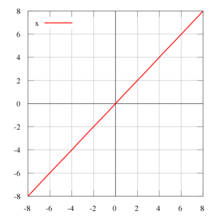
In mathematics, an identity function, also called an identity relation, identity map or identity transformation, is a function that always returns the value that was used as its argument, unchanged. That is, when f is the identity function, the equality f(x) = x is true for all values of x to which f can be applied.
Definition
[edit]Formally, if X is a set, the identity function f on X is defined to be a function with X as its domain and codomain, satisfying
In other words, the function value f(x) in the codomain X is always the same as the input element x in the domain X. The identity function on X is clearly an injective function as well as a surjective function (its codomain is also its range), so it is bijective.[2]
The identity function f on X is often denoted by idX.
In set theory, where a function is defined as a particular kind of binary relation, the identity function is given by the identity relation, or diagonal of X.[3]
Algebraic properties
[edit]If f : X → Y is any function, then f ∘ idX = f = idY ∘ f, where "∘" denotes function composition.[4] In particular, idX is the identity element of the monoid of all functions from X to X (under function composition).
Since the identity element of a monoid is unique,[5] one can alternately define the identity function on M to be this identity element. Such a definition generalizes to the concept of an identity morphism in category theory, where the endomorphisms of M need not be functions.
Properties
[edit]- The identity function is a linear operator when applied to vector spaces.[6]
- In an n-dimensional vector space the identity function is represented by the identity matrix In, regardless of the basis chosen for the space.[7]
- The identity function on the positive integers is a completely multiplicative function (essentially multiplication by 1), considered in number theory.[8]
- In a metric space the identity function is trivially an isometry. An object without any symmetry has as its symmetry group the trivial group containing only this isometry (symmetry type C1).[9]
- In a topological space, the identity function is always continuous.[10]
- The identity function is idempotent.[11]
See also
[edit]References
[edit]- ^ Knapp, Anthony W. (2006), Basic algebra, Springer, ISBN 978-0-8176-3248-9
- ^ Mapa, Sadhan Kumar (7 April 2014). Higher Algebra Abstract and Linear (11th ed.). Sarat Book House. p. 36. ISBN 978-93-80663-24-1.
- ^ Proceedings of Symposia in Pure Mathematics. American Mathematical Society. 1974. p. 92. ISBN 978-0-8218-1425-3.
...then the diagonal set determined by M is the identity relation...
- ^ Nel, Louis (2016). Continuity Theory. p. 21. doi:10.1007/978-3-319-31159-3. ISBN 978-3-319-31159-3.
- ^ Rosales, J. C.; García-Sánchez, P. A. (1999). Finitely Generated Commutative Monoids. Nova Publishers. p. 1. ISBN 978-1-56072-670-8.
The element 0 is usually referred to as the identity element and if it exists, it is unique
- ^ Anton, Howard (2005), Elementary Linear Algebra (Applications Version) (9th ed.), Wiley International
- ^ T. S. Shores (2007). Applied Linear Algebra and Matrix Analysis. Undergraduate Texts in Mathematics. Springer. ISBN 978-038-733-195-9.
- ^ D. Marshall; E. Odell; M. Starbird (2007). Number Theory through Inquiry. Mathematical Association of America Textbooks. Mathematical Assn of Amer. ISBN 978-0883857519.
- ^ James W. Anderson, Hyperbolic Geometry, Springer 2005, ISBN 1-85233-934-9
- ^ Conover, Robert A. (2014-05-21). A First Course in Topology: An Introduction to Mathematical Thinking. Courier Corporation. p. 65. ISBN 978-0-486-78001-6.
- ^ Conferences, University of Michigan Engineering Summer (1968). Foundations of Information Systems Engineering.
we see that an identity element of a semigroup is idempotent.